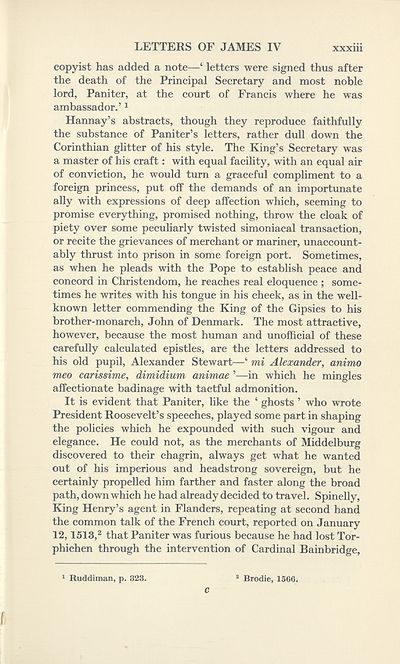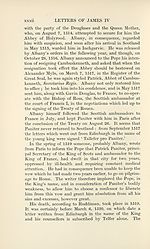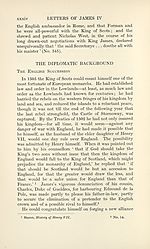Series 3 > Letters of James the Fourth, 1505-1513
(40) Page xxxiii
Download files
Complete book:
Individual page:
Thumbnail gallery: Grid view | List view

LETTERS OF JAMES IV xxxiii
copyist has added a note—‘ letters were signed thus after
the death of the Principal Secretary and most noble
lord, Paniter, at the court of Francis where he was
ambassador.’1
Hannay’s abstracts, though they reproduce faithfully
the substance of Paniter’s letters, rather dull down the
Corinthian glitter of his style. The King’s Secretary was
a master of his craft: with equal facility, with an equal air
of conviction, he would turn a graceful compliment to a
foreign princess, put off the demands of an importunate
ally with expressions of deep affection which, seeming to
promise everything, promised nothing, throw the cloak of
piety over some peculiarly twisted simoniacal transaction,
or recite the grievances of merchant or mariner, unaccount¬
ably thrust into prison in some foreign port. Sometimes,
as when he pleads with the Pope to establish peace and
concord in Christendom, he reaches real eloquence ; some¬
times he writes with his tongue in his cheek, as in the well-
known letter commending the King of the Gipsies to his
brother-monarch, John of Denmark. The most attractive,
however, because the most human and unofficial of these
carefully calculated epistles, are the letters addressed to
his old pupil, Alexander Stewart—‘ mi Alexander, animo
meo carissime, dimidium animae ’—in which he mingles
affectionate badinage with tactful admonition.
It is evident that Paniter, like the ‘ ghosts ’ who wrote
President Roosevelt’s speeches, played some part in shaping
the policies which he expounded with such vigour and
elegance. He could not, as the merchants of Middelburg
discovered to their chagrin, always get what he wanted
out of his imperious and headstrong sovereign, but he
certainly propelled him farther and faster along the broad
path, down which he had already decided to travel. Spindly,
King Henry’s agent in Flanders, repeating at second hand
the common talk of the French court, reported on January
12,1513,2 that Paniter was furious because he had lost Tor-
phichen through the intervention of Cardinal Bainbridge,
1 Ruddiman, p. 323. 2 Brodie, 1566.
C
I
copyist has added a note—‘ letters were signed thus after
the death of the Principal Secretary and most noble
lord, Paniter, at the court of Francis where he was
ambassador.’1
Hannay’s abstracts, though they reproduce faithfully
the substance of Paniter’s letters, rather dull down the
Corinthian glitter of his style. The King’s Secretary was
a master of his craft: with equal facility, with an equal air
of conviction, he would turn a graceful compliment to a
foreign princess, put off the demands of an importunate
ally with expressions of deep affection which, seeming to
promise everything, promised nothing, throw the cloak of
piety over some peculiarly twisted simoniacal transaction,
or recite the grievances of merchant or mariner, unaccount¬
ably thrust into prison in some foreign port. Sometimes,
as when he pleads with the Pope to establish peace and
concord in Christendom, he reaches real eloquence ; some¬
times he writes with his tongue in his cheek, as in the well-
known letter commending the King of the Gipsies to his
brother-monarch, John of Denmark. The most attractive,
however, because the most human and unofficial of these
carefully calculated epistles, are the letters addressed to
his old pupil, Alexander Stewart—‘ mi Alexander, animo
meo carissime, dimidium animae ’—in which he mingles
affectionate badinage with tactful admonition.
It is evident that Paniter, like the ‘ ghosts ’ who wrote
President Roosevelt’s speeches, played some part in shaping
the policies which he expounded with such vigour and
elegance. He could not, as the merchants of Middelburg
discovered to their chagrin, always get what he wanted
out of his imperious and headstrong sovereign, but he
certainly propelled him farther and faster along the broad
path, down which he had already decided to travel. Spindly,
King Henry’s agent in Flanders, repeating at second hand
the common talk of the French court, reported on January
12,1513,2 that Paniter was furious because he had lost Tor-
phichen through the intervention of Cardinal Bainbridge,
1 Ruddiman, p. 323. 2 Brodie, 1566.
C
I
Set display mode to:
![]() Universal Viewer |
Universal Viewer | ![]() Mirador |
Large image | Transcription
Mirador |
Large image | Transcription
Images and transcriptions on this page, including medium image downloads, may be used under the Creative Commons Attribution 4.0 International Licence unless otherwise stated. ![]()
| Scottish History Society volumes > Series 3 > Letters of James the Fourth, 1505-1513 > (40) Page xxxiii |
|---|
| Permanent URL | https://digital.nls.uk/126697071 |
|---|
| Attribution and copyright: |
|
|---|
| Description | Over 180 volumes, published by the Scottish History Society, containing original sources on Scotland's history and people. With a wide range of subjects, the books collectively cover all periods from the 12th to 20th centuries, and reflect changing trends in Scottish history. Sources are accompanied by scholarly interpretation, references and bibliographies. Volumes are usually published annually, and more digitised volumes will be added as they become available. |
|---|


